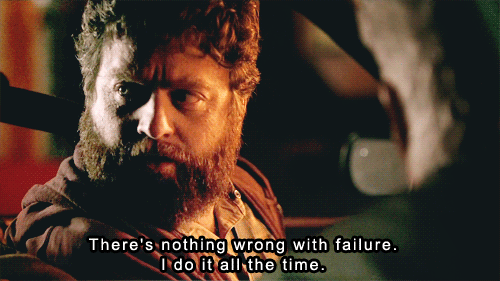
On the outside, you have it together. You appear confident and seem ready to take on the world. On the inside, your fear of failure is causing you to think twice about your dreams. This self-doubt, anxiety in the face of rejection and an altogether fear of failing can be paralyzing. It has a tendency to stop us in our tracks and can even cause us to walk away from what we want most. But why?
“Fear of failing is, for sure, a legitimate fear,” said professional counselor and certified life coach, Bryan Manion. “It’s centered around self-worth. It cripples people from making decisions because of this concern of what others will think once you fail and you can’t come back from it.”
The idea that people can’t bounce back from failure is a commonly held misconception, mainly because people tend to underestimate how resilient they really are.
Take Bill Gates, for instance. This innovative billionaire is a classic example of someone who learned from failure and turned it around to create long-term success. And, we are talking big success, like owning his own $63 million dollar computerized mansion success.
However, before Gates was the richest person in the entire world, his first company, Traf-O-Data, pretty much bombed. As summarized by Gate’s partner, Paul Allen, Traf-O-Data “wasn’t a roaring success.” But, the experience Gates and Allen gained from their failed endeavor allowed them to develop Microsoft software a few years later.
When we allow fear to stop our progress in life, we're likely to miss some great opportunities for success along the way. But what aspects of potential failure manage to halt our progress?

No Guarantees
People love instant gratification. We live in an “I want it and I want it now” society where five minutes is too long to wait for anything. Feeling down? Stop at Starbucks and your day will be instantly better.
While students flock to instant caffeine fixes and Smartphone solutions, the idea of “instant gratification” shifts our focus away from effort and resilience and straight to quick fixes. Uncertainty of the future outcome of an immediate action can often lead to this “fear of failure” phenomenon.
Take a big picture approach by taking a look at those around you who have succeeded in an area that interests you. More than likely, their road to success was not instantaneous nor easy.
In this month’s issue of Glamour, cover girl, Katie Holmes said, “It was instilled in me that you work… You just keep going. Nothing worth having happens quickly.”
Failure can even motivate you to conquer through the next challenge.

Failure Can Be Good
As frustrating as failure can be, falling short of your expectations can also be a good thing. The art of perfecting a skill means making changes for the better, not getting it right the very first time you attempt something.
“Any successful person knows that failure is not a bad thing,” life coach Bryan Manion said. “It is the best way to learn.”
On the other hand, fear of failure can hold you back. Drew Bollinger, a junior at the University of Illinois, says that it was her fear of failing that caused her to abandon her dream of playing for a Division I women’s’ soccer team in college.
“I spent 15 years of my life playing soccer and set my sights on playing in college,” Bollinger said. “My junior year of high school I gave a verbal commitment to play for the University of Louisiana-Lafayette, and I was so excited at the time. But two months before signing my national letter of intent, I called the coach and backed out because I was genuinely afraid that I wouldn't be good enough.”
Bollinger said that her decision still has her wondering “what if."

Breaking the Cycle
“The fear of failing is a motivator and a devastator at the same time; it can either help or hurt you,” Bollinger said. “If you don't take advantage of the motivation aspect then it will drag you down.”
It’s important to understand this fear of failure phenomenon, and how letting fear consume you can negatively impact your life. There are several tools one can use to better understand their own fear of failure.
Start by asking yourself, “Why do I fear imperfection?” “What about failure do I fear?” And, “How can I channel fear into motivation?” Questions such as these are great first steps in understanding and controlling your fear.
Next, it’s all about gaining confidence and knowing that you do have control over your future. If you think you will fail, chances are, you will. Believe in yourself and block out that little voice in your head that tells you that you can’t.
To get in touch with what you want to pursue and how you can better ensure your success, start by talking with friends and family. Having a serious conversation with those who know you best will help you better understand your strengths, weaknesses and how you can showcase your positive qualities.
If you aren’t comfortable talking about your fear of failing just yet, there are plenty of experts on the subject worth exploring. Chandra Johnson, a recent graduate from the Fashion Institute of Technology, said she experienced a lot of anxiety about failure and letting people down over the last year. To cope, she read a book called, “You Are a Badass: How to Stop Doubting Your Greatness and Start Living an Awesome Life” by Jen Sincero.
“It really changed the way I view life and become a lot more positive since reading it,” Johnson said.

Say Goodbye to Self-Doubt
It’s time to live fearlessly. Take a deep breath and consciously decide to take chances. Life is too short to get in your own way – all because of what you might mess up. Just as there are no guarantees that you will succeed immediately, it’s also not for sure that you will fail, either.
“If you have a good day in regards to your goals, then pat yourself on the back,” Manion said. “If you have a bad day, just remember it is only one day. Surround yourself with people that want to accomplish similar goals. Remember at the end of the day, no matter what happens, no one thing defines you as a person.”




















